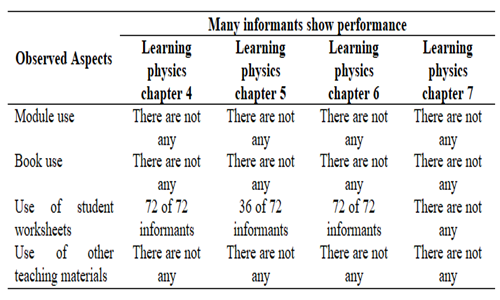
Analysis of Merdeka Curriculum-based Electronic Module Needs for Physics Learning Phase F
Abstract
Keywords
Full Text:
PDFReferences
Afinda, B. N., Anwar, S., & Sumarna, O. (2023). Analysis of The Need for Applied Science Teaching Materials in Chemical Materials in Vocational School, Department of Culinary, Tangerang District. Journal of Education and Learning Research, 30-36.
Afriyanti, M., Suyatna, A., & Viyanti. (2021). Design of e-modules to stimulate HOTS on static fluid materials with the STEM approach. Journal of Physics: Conference Series, 1788(1). Anggraena, Y., Felicia, N., Eprijum, D., Pratiwi, I., Utama, B., Alhapip, L., & Widiaswati, D. (2022). Kurikulum untuk Pemulihan Pembelajaran.
Anggraena, Y., Ginanto, D., Felicia, N., Andiarti, Herutami, I., Alhapip, L., Iswoyo, S., Hartini, Y., & Mahardika, R. L. (2022). Pembelajaran dan Asesmen. Badan Standar, Kurikulum, dan Asesmen Pendidikan Kemendikbudristek RI.
Azizah, R., Yuliati, L., & Latifah, E. (2015). Kesulitan Pemecahan Masalah Fisika pada Siswa SMA. Jurnal Penelitian Fisika Dan Aplikasinya (JPFA), 5(2).
Bella, S., Azhar, A., & Nur, I. (2023). Development of Think-Pair-Share (Tps) Model Based Learning Tools for Global Warming Materials. Journal of Education and Learning Research, 20-29.
Ekawati, E. Y., & Prastyo, A. (2022). Optimization of TPACK-based Project Learning in Micro-teaching Courses in Physics Education Study Programs during the Pandemic. Journal of Physics: Conference Series, 2392(1).
Ezz, I. S. A. A. R. (2023). The uses of digital technology by faculty members and their attitudes towards e-learning in government media colleges and departments. The Egyptian Journal of Media Research, 2023(82), 697–727.
Hanum, H., Niah, S., & Pahmi, P. (2023). The Development of Podcast-Based-Audio Learning in Material Introducing Ourselves at 10th Grade SMA Muhammadiyah 1 Pekanbaru. Journal of Education and Learning Research, 37-46.
Jamun, Y. M. (2018). Dampak Teknologi terhadap Pendidikan. Jurnal Pendidikan Dan Kebudayaan Missio, 10(1), 1–136.
Jojor, A., & Sihotang, H. (2022). Analisis Kurikulum Merdeka dalam Mengatasi Learning Loss di Masa Pandemi Covid-19 (Analisis Studi Kasus Kebijakan Pendidikan). Edukatif : Jurnal Ilmu Pendidikan, 4(4), 5150–5161.
Magdalena, I., Sundari, T., Nurkamilah, S., & Ayu Amalia, D. (2020). Analisis Bahan Ajar. Jurnal Pendidikan Dan Ilmu Sosial, 2(2), 311–326.
Mayer, P., & Girwidz, R. (2019). Physics Teachers' Acceptance of Multimedia Applications—Adaptation of the Technology Acceptance Model to Investigate the Influence of TPACK on Physics Teachers' Acceptance Behavior of Multimedia Applications. Frontiers in education, 4.
Nugroho Yuliono, S., Sarwanto, S., & Cari, C. (2018). Physics-Based Scientific Learning Module to Improve Students Motivation and Results. Journal of Education and Learning (EduLearn), 12(1), 137–142.
OECD. (2019). PISA 2018 Result Combined Executive Summaries. PISA-OECD Publishing.
Prastowo, A. (2012). Panduan Bahan Ajar Tematik. Diva Press.
Prastyo, A., Fithriyah, H., & Ekawati, E. Y. (2022). Konstruksi Indikator Penilaian Proyek Berbasis Profil Pelajar Pancasila pada Pembelajaran Fisika Fase F. Prosiding SNFA (Seminar Nasional Fisika Dan Aplikasinya), 1–9.
Purwanto, A., Asbari, M., & Wijayanti, L. M. (2020). Impact of the COVID-19 Pandemic on Online Home Learning: An Explorative Study of Primary Schools in Indonesia. International Journal of Advanced Science and Technology, 29(5).
Puspitasari, R., Mufit, F., & Asrizal. (2022). Kepraktisan E-Book Berbasis Konflik Kognitif Menginterasikan Real Experiment Vidio Analysis untuk Meningkatkan Pemahaman Konsep Siswa. Jurnal Penelitian Dan Pembelajaran Fisika, 8(1), 27–36.
Rahmawati, F., Sarwanto, S., & Budiawanti, S. (2021). Needs analysis of physics e-module based on hybrid-PBL model on critical thinking skills improvement. Momentum: Physics Education Journal, 175–181.
Ramadayanty, M., Sutarno, S., & Risdianto, E. (2021). Pengembangan E-Modul Fisika Berbasis Multiple Representation untuk Melatihkan Keterampilan Pemecahan Masalah Siswa. Jurnal Kumparan Fisika, 4(1), 17–24.
Resita, I., & Ertikanto, C. (2018). Designing electronic module based on learning content development system in fostering students' multi representation skills. Journal of Physics: Conference Series, 1022(1).
Sani, D. M., Sukarmin, & Suharno. (2021). The needs analysis for the development of electronic learning module (e-module) based on local wisdom information search in senior high schools' physics online learning during COVID-19 pandemic. IOP Conference Series: Earth and Environmental Science, 1796(1).
Saputri, A., Anwar, S., & Halimatul, H. S. (2022). Analysis of Module Needs as Chemical Teaching Materials on Colloidal Subjects in SMA Negeri 1 Tembilahan. Journal of Educational Sciences, 6(4), 645–652. https://doi.org/10.31258/jes.6.4.p.645-652
Serevina, V., & Sari, I. J. (2018). Development of E-Module Based on Problem Based Learning (PBL) on Heat and Temperature to Improve Student's Science Process Skill. TOJET: The Turkish Online Journal of Educational Technology, 17(3).
Sumarmi, Bachri, S., Irawan, L. Y., & Aliman, M. (2021). E-module in blended learning: Its impact on students' disaster preparedness and innovation in developing learning media. International Journal of Instruction, 14(4), 187–208.
Thiagarajan, S., Semmel, D. S., & Semmel, M. I. (1974). Instructional Development for Training Teachers of Exceptional Children. A Sourcebook Indiana: Indiana University.
Wulandari, D., Risdianto, E., Masito, F., Setiawan, I., & Efendi, R. (2022). Analysis of E-Module Development Needs on the Topic of Quantity and Units at High Schools in Payakumbuh. Jurnal Manajemen, Kepemimpinan, Dan Supervisi Pendidikan, 7(1), 210–227.
DOI: http://dx.doi.org/10.31258/jes.8.1.p.128-139
Refbacks
- There are currently no refbacks.
Copyright (c) 2024 Agung Prastyo, Elvin Yusliana Ekawati, Shofi Hikmatuz Zahroh

This work is licensed under a Creative Commons Attribution 4.0 International License.
Publisher: FKIP Universitas Riau












